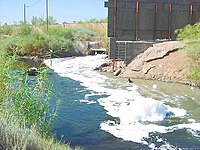
Photo from wikipedia
Traditional superhydrophobic cotton fabrics (CF) demonstrate various advantages such as self-cleaning, water repelling and efficient oil/water separation capacity but limited practical applications due to their poor mechanical robustness and environmental… Click to show full abstract
Traditional superhydrophobic cotton fabrics (CF) demonstrate various advantages such as self-cleaning, water repelling and efficient oil/water separation capacity but limited practical applications due to their poor mechanical robustness and environmental durability. In this work, robust and durable superhydrophobic polydivinylbenzene (PDVB) coated CF (PDVB@CF) are fabricated via a simple one-step, fluorine-free, and inorganic nanoparticle-free solvothermal method. The PDVB@CF displays excellent chemical resistance without losing superhydrophobicity after immersing in various organic solvents, strong acid and alkali solutions for a long time. The PDVB@CF shows excellent mechanical robustness to resist sandpaper abrasion and ultrasonication treatment. Furthermore, the PDVB@CF exhibits outstanding high and low temperature resistances since the contact angle of either acidic or alkali droplets is greater than 150° after isothermal treatment at 200 °C or immersion in liquid nitrogen for 3 h. The PDVB@CF is very efficient in separating water mixtures with various oily compounds with separation efficiency of higher than 98% and flux up to 56 k L m−2 h−1 depending on characteristics of the oils. In addition, the PDVB@CF shows excellent recyclability with superhydrophobicity and separation efficiency that remained after 10 separation cycles. The PDVB@CF with excellent robustness and durability exhibits potential utility in oil/water separation even under some harsh conditions.
Journal Title: Cellulose
Year Published: 2019
Link to full text (if available)
Share on Social Media: Sign Up to like & get
recommendations!